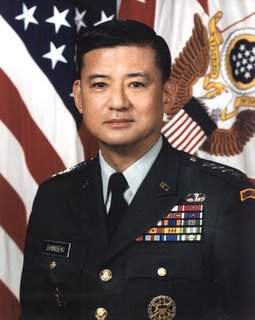Iraq Borders to Close...Two Years Too Late

Now that the Iraqi elections are less than a week away, the announcement has been made that Iraq will close its borders and institute a curfew to stem the possibility of disruptions of the election. That makes a lot of sense. It really does.
What doesn't make any sense is why it took the brain surgeons in charge of this cluster-$&%# well over two years to decide that closing the borders might be a wise decision. As we saw in previous conflicts in the Middle East and elsewhere, it often has been the influx of outsiders that has caused problems for the entity trying to establish power and control.
We saw it in Afghanistan in the 1980s when the Osama bin Laden-led mujahedeen rushed into the country to fight the Soviet occupiers. The fervor and commitment with which the mujahedeen fought - and, interestingly, the financial and weapons support provided by the U.S. - eventually forced the Soviets to withdraw after eight bloody years.
We almost saw it again in Bosnia in the late 1990s when the Serbs' "ethnic cleansing" of muslims nearly precipitated a similar invasion of mujahedeen. The United States got involved militarily at that point, via the UN, in part to stem the influx of mujahedeen, which had the potential to turn the Balkans into a bloody mess for years to come.
Students of history, which the Bush administration and its neo-conservative core clearly are not, knew that one of the first necessary actions after invading Iraq and toppling Saddam Hussein was the securing of the entire Iraq border. Not doing so invited the influx of a current-day mujahedeen intent on attacking and repelling the invading forces.
Would a strategy of border security have required significantly more military resources? Absolutely. In fact, U.S. Army General Eric Shinseki (pictured above) estimated prior to the invasion that "several hundred thousand" troops would be necessary to complete the mission. In response, civilian Pentagon leaders Donald Rumsfeld and Paul Wolfowitz criticized Shinseki's estimate and indicated that the necessary force would be closer to 100,000 troops.
Interestingly, General Shinseki is a former commander of the peacekeeping operation in Bosnia, so one would think he knows a thing or two about military operations.
Clearly, history lessons were not learned by the Bush administration as it pushed for war in Iraq. It's also clear that Deputy Secretary of Defense Wolfowitz didn't understand the nature of the eventual conflict, judging from his comments before a congressional committee early in 2003 (as detailed by New York Times reporter Eric Schmitt):
In his testimony, Mr. Wolfowitz ticked off several reasons why he believed a much smaller coalition peacekeeping force than General Shinseki envisioned would be sufficient to police and rebuild postwar Iraq. He said there was no history of ethnic strife in Iraq, as there was in Bosnia or Kosovo. He said Iraqi civilians would welcome an American-led liberation force that "stayed as long as necessary but left as soon as possible," but would oppose a long-term occupation force. And he said that nations that oppose war with Iraq would likely sign up to help rebuild it. "I would expect that even countries like France will have a strong interest in assisting Iraq in reconstruction," Mr. Wolfowitz said. He added that many Iraqi expatriates would likely return home to help.
Hindsight is 20/20, as they say. But the people we elect - and the people they appoint - ought to have at least the rudimentary knowledge required to make informed decisions. They also should "know what they don't know" and rely on the expertise of others, when necessary. It's the least we should expect from our leaders. Unfortunately, we're now ensnarled in a mess that didn't have to happen.
The barn door is closed, but the horses have already left the pen. Too little, too late.



0 Comments:
Post a Comment
<< Home